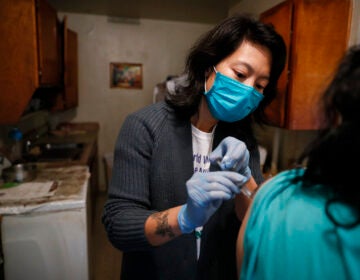Headstrong offers Philadelphia-area vets another option for free mental health care
In the Philadelphia region, Headstrong is referring vets to therapists at the Council for Relationships in West Philadelphia.

Joe Quinn (left), executive director of Headstrong, announces that the program that brings free mental health care to veterans and their families is coming to Philadelphia. He is joined by (from left) Deb D'Arcangelo, chief executive officer of Council for Relationships, Gerard Ilaria, clinical director of Headstrong, and former U.S. Army Under Secretary Patrick Murphy. (Emma Lee/WHYY)
A private, nonprofit organization that provides free mental health care for veterans is now helping former service members in the Philadelphia region.
Called Headstrong, the service doesn’t operate brick-and-mortar clinics; instead, it partners with providers in more than a dozen cities in 10 states.
At a launch event Wednesday, Headstrong executive director Joe Quinn said the organization had “sort of an Airbnb/Uber model” for treating the trauma and other mental health conditions many veterans experience as a result of their service.
“There’s limited overhead, and it’s just about basically funding the hours for the treatment, and that makes it so much more seamless,” Quinn said.
The most recent Veterans Affairs study found that 20 veterans die by suicide every day, a fact that was highlighted by speakers at the event.
Quinn, a veteran himself who had been treated through the Headstrong program, said the average cost for treating each veteran was about $5,000. That was funded entirely through philanthropic donations, he said.
Gerard Ilaria, the organization’s clinical director, said veterans seeking help are contacted within 48 hours of filling out a form on its website. Often, they are seen within a week. The system eliminates lengthy delays for care vets sometimes experience within the VA health care system, he said.
“It is an overwhelmed system at times, and people experience long wait times, let’s say, to see the psychiatrist,” Ilaria said. “Or if they are in a therapy, it may not be offered weekly. It may be offered every two to three weeks.”
Ilaria said 80 percent of veterans seeking help through Headstrong have already been to the VA for care. Headstrong may be an appealing alternative for some vets for several reasons, he said, including the relative privacy offered by the smaller clinics where the organization sends its clients. In the Philadelphia region, Headstrong is referring vets to therapists at the Council for Relationships in West Philadelphia.
But David Oslin, the chief of behavioral health at the Corporal Michael J. Crescenz VA Medical Center in Philadelphia, said long waits for an appointment are not an issue for veterans seeking care there.
“We can see people the same day, actually,” Oslin said. Appointments for new patients seeking psychotherapy and behavioral health care are scheduled on average within 10 to 12 days after they call the Philadelphia VA facility, Oslin said, and that’s because patients often don’t want to come in sooner.
“Access for veterans in Philadelphia is not a barrier for us,” Oslin said. “That doesn’t mean that people don’t need options,” he added, saying he was happy to have Headstrong expand to the region.
According to Headstrong’s website, it’s served more than 600 veterans to date.
Headstrong launched in Philadelphia on the same day President Donald Trump signed the Mission Act, which calls for expanding and improving a program that pays for private health care outside the VA system. The program originated in 2014 after a scandal involving excessive wait times for an appointment at a VA hospital in Phoenix.
The legislation passed with bipartisan support in Congress, though some critics such as the American Federation of Government Employees — the labor union for federal workers — opposed the measure on the grounds that it contributes to the privatization of the VA system.
WHYY is your source for fact-based, in-depth journalism and information. As a nonprofit organization, we rely on financial support from readers like you. Please give today.





